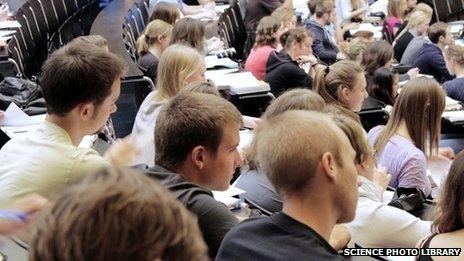Student loan repayment needs tighter control, say MPs
- Published

The number of student borrowers will double to 6.5m, says watchdog
The government is not doing enough to get student loans repaid as the total value of money owed continues to rise, a spending watchdog has warned.
The outstanding loan debt is £46bn and will rise to £200bn in the next 30 years, the National Audit Office said.
About 50% of students are not expected to earn enough to repay all their loan.
The NAO report, external also highlights concerns over the more than £5bn owed by about 368,000 former students whose exact whereabouts are unaccounted for.
It says officials are overestimating how much money will be recovered each year, and is not securing value for money for tax payers.
The increase in tuition fees in England has meant much higher levels of student loans and debts - and the spending watchdog says there needs to be much tighter scrutiny of levels of repayment.
Such an expansion requires a "much more robust strategy" for recovering loans, said Margaret Hodge, chair of the Commons Public Accounts Committee.
"It is essential that government collects every pound it can of the debt that should be collected," she said.
Off the radar
The report says there is a lack of employment information about the former students who owe more than £5bn.
This includes people who might be unemployed or have moved overseas, but the watchdog warns that too little is known about where they now are.
In March 2013, the report says, there were 14,000 students living overseas, who were behind with repayments of £100m.
The report says the Student Loans Company could do more to retrieve these missing payments.
This is against a rapidly rising number of UK students who are taking out student loans, with the NAO reporting that the number of borrowers will more than double to 6.5 million people over the next three decades.
The report warns that the government has previously been over-optimistic in how much is likely to be repaid by students.
The expected level of debt to be written off had been set at 28% in 2010, which had risen to 35% by 2013.
Labour's university spokesman, Liam Byrne, said figures from the House of Commons library showed this had risen to more than 40%, which would cost a further £600m.
"We may be at the point where so many students loans are being written off, that the government's new student finance system is actually more expensive than the old arrangements, even though the government is asking students for three times as much money," said Mr Byrne.
Earlier this week the government announced the sale of part of the student loan book to the private sector, from a type of student loan from the 1990s.
There are ambitions to sell off the bigger, income-related loans that have come with higher fees - a move that will be much more politically sensitive.
'Unsustainable'
The report notes that the Department for Business, Innovation and Skills is "preparing to sell early cohorts of the income‑contingent repayment loan book, and will take a sale decision in due course".
Martin Freedman of the ATL teachers' union said the report showed the loan system was "out of control".
"The system is unsustainable and the government needs to review it urgently," said Mr Freedman, who argued that it would result in "unbelievable" levels of debt.
He also criticised spending £27m on debt collection, which he said would have been better used on education.
The head of the National Audit Office, Amyas Morse, said the increasing cost of the student loan system required a "more energetic and considered approach" and a "high level of collection performance".
A Department for Business, Innovation and Skills spokesman said: "The report demonstrates that there is an effective and efficient process resulting in high collection rates at a low cost which we believe demonstrates good value for money.
"We need to ensure that all borrowers who are earning over the relevant payment threshold are repaying their loans, including those who have moved overseas after leaving their course."
- Published25 November 2013
- Published4 October 2013